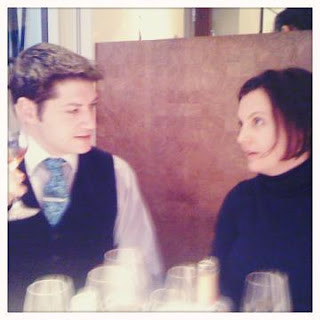
“Then I brought up this question: When you say, Men do desire pleasure, what is this use of “pleasure?” Is it contrasted with pain? Pain is localized, for instance.
He went on with one of the nicest bits of analysis I heard… He started: Pain is a sensation. Pleasure is not. Why are the senses classified together? Obviously they are not a bit alike. Smells, odors, aren’t a bit like sounds. Then he gave this account. With respect to all these, you can time them precisely with a clock. “Now you see; now you don’t. Now you hear it; now you don’t.” By the clock you can tell. Now pleasure isn’t like this. The logic of the word pleasure is quite different. Clock the pleasure. When did the pleasure begin, when did the pleasure end, etc?”
“Wittgenstein conversations 1949 – 1951”, p 63, Oxford. Wittgenstein
Each Gruner Veltliner I have tended to taste is often so demanding, different or weird that I approach this Austrian grape as I would a hard soduku puzzle, slightly exhausted by the idea of the pleasure. It is a puzzle: in Austria, the spicy white is an everyday wine enjoyed in the same way as Chardonnay; but, here, Gruner Veltliner is still an exotic treat.
Schloss Gobelsburg is a benchmark in the Austrian style of Gruner Veltliner, so I joined the customers of Berry Bros & Rudd in their St James Street cellars ready to test my assumptions.
Like all outstanding winemakers, Michael Moosbrugger has done all the philosophical hard work for you; what is left in the glass is pure visceral pleasure. The Schloss Gobelsburg vineyards in the Danube had been owned by the monks since medieval times and the power of contemplation continues.
Each wine is like a philosophical answer to a question.
One of the questions he posed: How much can a winemaker really reduce manipulation of the wine? Can a winemaker really do nothing – does the terroir really speak for itself?
To test his question he went back to the Schloss Gobelsburg monastic wine library to look at how wine was made before 1850 and the industrial revolution. Before then, a winemaker had the same ideas for making wine that existed in Ancient Roman times. In Roman times, wine was based on the Platonic idea of breathing and oxygen. Wine was an organic thing, an embryo that needed to grow and breathe with periodic moments of oxygen to bring the wine to life. The winemaker was only a midwife. Today with modern technology and understanding, the philosophy in the cellar is more about protecting the aromas and reducing fragile components: which results in a wine that is cleaner, streamlined and fresher.
The answer to his theory: 2008 Gruner Veltliner, Tradition. This is wine made in the pre-industrial style. Compared to the other Gruner Veltliner wines we tasted, this wine was deeper gold in colour, richer and more savoury. It had an incredible depth but already seemed more developed than other Gruner Veltliner shown from the 2009 vintage.
For the people at the tasting, the 2009 Gruner Veltliner, Lamm was the favourite. From volcanic and sandstone soils it had a very refined palate, peppered with floral notes. Precise and completely in balance like an expensive watch. But it was the 2009 Gruner Veltliner, from the region of Grub, that really held my attention: like an abstract cologne of white pepper on the nose with fresh fruit on the finish. It had a distinctly modern, abstract, cool personality as if it belonged in the museum of modern art. I admit this will not be to everyone’s taste, but still, very thrilling.

Prepared for Wittgenstein’s Philosophical Investigations, I came away from the night with the impression of the shimmering gold of Klimt. Pepper. Yes there was strict pepper, but also a lush golden character. Ending with the incredible sweet wine, 2008 Gruner Veltliner Eiswein, tasting of caramelised pear with amazing aged Comte cheese characters, only confirmed my belief that great Austrian wine can be an intellectual as well as a pure sensual pleasure.
The tasting ended at 8.31pm, but the wines shined well into the dark, rainy night.
Food matched: Wild Mushroom & truffle strudel, Herb spaetzle with Gruyere fondue, Fois gras parfait on toasted brioche, Weiner Schnitzel with sauce gribiche, Austrian sausage with mustard.
Images: "wittgenstein illustration 2nd reading branch, 1973" Mel Brochner; "Adele Bauch-Bauerm 1907" Gustav Klimt
Thank you to David Berry Green, Berry Bros & Rudd and winemaker Michael Moosbrugger for the opportunity to taste these incredible wines from Schloss Gobelsburg. Tasted 16.02.11.

















































